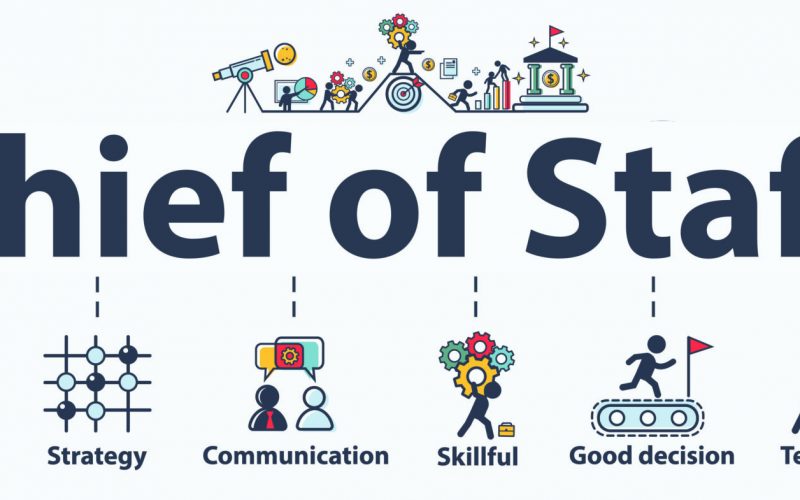The title chief of staff (or head of staff) refers to the leader of a complex organization, such as the armed forces, an institution, or a group of people. It may also refer to a principal staff officer (PSO), who is the coordinator of the supporting staff or a primary aide-de-camp to an important individual, such as a president, a senior military officer, or the leader of a large organization. Let’s see the job description and duties of a chief of staff and the special qualifications and skills that make a great chief of staff.
Who is a Chief of Staff?
A chief of staff, in general, acts as a barrier between a chief executive and the executive’s immediate reporting team. In general, the chief of staff works behind the scenes to handle problems, manage disputes, and deal with matters before they are brought to the chief executive. Chiefs of staff frequently serve as a confidant and advisor to the CEO, serving as a sounding board for ideas. Finally, the real duties of a chief of staff is determined by the role and the persons involved.
A Chief of Staff, also known as a Chief Senior Assistant, assists executive staff in their duties by taking on minor responsibilities or performing day-to-day tasks. Chief of staff duties include attending meetings on behalf of the senior leader and taking notes, leading and implementing various strategic planning procedures across the corporation, and giving vital company information to leadership members in preparation for upcoming meetings or presentations.
COS is an excellent professional path for someone who:
- thrives in a leadership position
- Is organized and operationally minded, yet prefers to keep his head out of the weeds.
- Can make difficult decisions and connect the dots throughout an organization
- Can adapt and bend to address gaps in a developing business
- Isn’t frightened, to tell the truth (especially to their Principal)
- Is a naturally inquisitive, learning-based, and growth-minded person.
- Enjoys variety and thrives on challenges and change, working behind the scenes to solve problems and advance projects.
- Has a broad education and a diverse set of experiences, as long as the individual possesses great communication, project management, and leadership skills.
- If you excel at and enjoy the following responsibilities, a career as a Chief of Staff may be for you.
Responsibilities and Duties of the Chief of Staff
A Chief of Staff will help an organization’s day-to-day operations by providing excellent leadership and problem-solving skills. A Chief of Staff is normally in charge of the following duties:
- Collaborating with members of the executive team to establish and prioritize business initiatives
- Managing the Chief Executive’s schedule, organizing meetings, and making travel arrangements
- Providing advice and consulting to department leaders in order to increase collaboration
- Planning, arranging, and maintaining the emphasis of a meeting’s contents
- Identifying important performance indicators and measuring team performance
How to Write a Job Description for a Chief of Staff
Your job posting should be brief and straightforward in order to attract the best chief of staff. It explains how candidates will contribute to your organization from the start, and how those contributions will affect your performance. It should also introduce your organization in a style that reveals your norms and beliefs.
Examine your job duties, responsibilities, and credentials thoroughly, ensuring that every point appropriately reflects your chief of staff expectations. Avoid jargon and slang by using direct language. Keep your lists to a maximum of six bullets each.
Chief of Staff Job Description Examples:
#1. The Chief of Staff
Hire Tech Solutions is looking for a Chief of Staff for one of its New York clients.
Concerning the Position.
- Work with the CEO and senior team to develop yearly, quarterly, and monthly strategic priorities and to facilitate workflows to move them forward.
- Drive efforts to improve the CEO’s, executive team’s, and BDT’s broader group of managers’ efficiency and effectiveness.
- Manage the CEO’s preparation for major internal and external meetings and events.
- Staff the directors with the ability to manage annual operational goals, and the chiefs with the ability to manage multi-year strategic goals.
About You.
- 5-10 years of experience in a similar discipline is required.
- 2-4 years of experience as a C-level executive in a rapidly expanding firm.
- A master’s degree in business, marketing, or administration is preferred.
- Worked as part of a team in a fast-paced environment.
- Excellent communication, analytical, organizational, and writing skills.
Chief of Staff Job Description: Full-time
Salary range: $120,000.00 to $140,000.00 per year
Benefits:
- Health-care coverage
- Dental coverage
- Insurance for your eyes
- Retirement strategy
- Paid vacation
- Monday through Friday, parental tuition is available.
#2. The Chief of Staff
Responsibilities
- Gatekeeping and monitoring of multi-platform communications to and from the Chairman’s Office
- Assisting in, and eventually ensuring, the execution of creative initiatives on time
- Assist the executive in liaising with artists, managers, producers, and interns.
- Maintain executive organization.
- When the executive is unavailable, make rapid and precise decisions.
- Keep up with the latest music news.
- Assist in keeping the executive team informed about company activities, marketing, concerts, promotions, and issues.
- Plan events as needed.
- Oversee the administration of around 20 college students while preparing college representatives for future job options within Son of a Gun!
Qualifications
- Extremely organized and detail-oriented while working in a fast-paced, often stressful setting
- Capable of handling confidential material with professionalism and caution.
- Relationships with music industry producers, songwriters, and/or managers
- Excellent interpersonal skills and the ability to interact with staff at all levels are required.
- Proactive, adaptable, and capable of making sound decisions
Chief of Staff Job Description: Full-time
Salary range: $0.00 to $1.00 per hour
Experience:
1 year of management experience (Preferred)
A good job for someone who is new to the workforce or returning to the workforce with less experience, and it is available Monday through Friday.
What does a Chief of Staff do?
Chiefs of Staff frequently take on responsibilities that executive team members do not have time to perform. They frequently handle a company’s everyday operations by connecting and engaging directly with employees to discover any difficulties and deliver beneficial solutions. Chief of Staff take the knowledge they receive from their day-to-day duties and transmit any essential details to executive members in order to keep them active in the company’s operations.
Internal and external communications with employees and clients are often handled by them through speeches, reports, and newsletters. Chiefs of Staff are normally in charge of establishing and executing any company-wide initiatives and projects. They will then communicate these decisions and efforts to members of the executive staff.
How many chiefs of staff do we have in the United States?
While small firms continue to account for the vast majority of businesses in the United States, corporations – where heads of staff are most commonly found – are becoming more common. According to Tyler Parris, author of “Chief of Staff: The Strategic Partner Who Will Revolutionize Your Organization,” around 68,000 persons work as chief of staff in the United States alone. This total does not include governmental or military groups.
Adapting the Job to the Need
Based on my observations of how this role has evolved in commercial organizations, it appears to have three levels of responsibility.
1st Level
A CoS at level one is often promoted from the position of executive assistant. Susan, for example, was the most senior of two EAs to the CEO of a large energy-related firm before becoming his CoS. Her senior EA replacement and the other assistant now report to her. She supervises specific initiatives for the CFO and the head of human resources, in addition to managing the CEO’s time management and keeping his attention on the most essential topics. She also does prework, and follow-up, and attends most board meetings.
Susan has been with the company for 20 years, working under three CEOs, and she understands the culture. She has strong project management skills, is well-liked by all of the CEO’s direct subordinates, and was underutilized in her executive assistant job.
2nd level
Greg is representative of a CoS at the second level. He became chief of staff at a prominent life sciences company after receiving a Ph.D. and an MBA from prestigious universities and then worked for a strategy consulting firm whose customer was his present boss. Greg collaborates closely with the heads of business development and R&D on alliance and acquisition projects, as well as with the chief human resources officer on scientific talent acquisition.
Much of Greg’s time is devoted to assisting in the management of relationships with the company’s scientific partners and researching the forces that influence the company’s strategy, such as academic research, medical developments, and competitor activities. He also works with regulatory agencies to get the company’s new items approved. Greg has no direct reports, but he does have significant responsibilities and a constantly changing portfolio of projects requiring advanced skills.
3rd level
Level three chiefs of staff are generally found in large, complex companies that require major strategic, operational, and cultural transformation, especially when the leader is new to the top position. This position is the most similar to the powerful CoS roles seen in government and the military. Carol, for example, exemplifies this.
Carol spent 12 years at a multinational technology and operations-improvement consulting firm focusing on acquisition integration and alliance management after gaining degrees in economics, psychology, and management. Following that, I worked for a multinational firm for several years as a division president’s CoS and the head of its planning and analytical divisions. She was then hired as a CoS for the new CEO of a huge and rapidly expanding technology company.
Qualifications and Skills of the Chief of Staff
Emotional intelligence, leadership, information processing, and initiative are the most crucial chief of staff skills. Furthermore, some of a Chief of staff’s most important skills are dependent on the people with whom they work.
Complementary skills are tremendously vital between the Chief of Staff and the CEO. However, compatible instincts and values are extremely useful for being able to speak and act on behalf of the CEO.”
To cover all of the skills these people can and do have, a browser with infinite scroll would be required, but here is a complete list:
#1. Chief of Staff Hard Skills
- Data Literacy
- Best management practices
- Process administration
- Project administration
- Public Speaking
- Dispute resolution
- Legal comprehension
- Planning for the future
- Analytical skills
- Literacy in research
- Systems, design, and divergent thinking are all examples of divergent thinking.
- Communication tactic skills
- Coaching methods
- Understanding of psychological frameworks
#2. Chief of Staff Soft Skills
- Resourcefulness
- Problem-solving
- Self-awareness
- Influence
- Conscientiousness
- Insight
- Commitment and follow-through
- Organizational skills
- Prioritizing
- Quick learning
- Multitasking
- Rapid processing and learning
- Motivational leadership includes the capacity to encourage employees through employee recognition initiatives.
What Qualities Distinguish a Good Chief of Staff?
You’ve probably figured out by now that chiefs of staff are all-around powerhouses who can accomplish almost whatever they set their minds to. You might be looking for more specific advice on how to be a great chief of staff. Here are some pointers that go beyond simply being excellent and on top of everything.
- Qualifications
- 8+ years of management experience
- Leadership skills that are not symmetrical
- Proven track record of converting data and metrics into action
- Experience managing high-profile initiatives is required.
- A strong portfolio of written and verbal communication skills
- Social and emotional intelligence
- Capability to reach and maintain consensus across disparate groupings
- Excellent analytical skills
- Decision-making skills that are astute and accountable
- Experience in project management
- Compassion and foresight
- Chief of Staff Education
- Cornell’s Systems Thinking
- Qualifications for SHRM People Managers (PMQ)
- Design Thinking in the Service of Innovation
- Specialization in Human Resource Management and Leadership
- Analyzing People
- Specialization in Strategic Leadership and Management
- Diversity and Inclusion for Human Resource Professionals
- EA Training and Development is an added bonus.
Education and Training Requirements for Chief of Staff
While some applicants for Chief of Staff hold a bachelor’s degree, many hiring managers prefer at least a master’s degree. Candidates typically hold a bachelor’s degree in business administration or a related field such as finance, economics, or logistics. A Chief of Staff is frequently expected to have prior training, either through an educational program or in an executive capacity. Some Chiefs of Staff may choose to pursue qualifications before or during their employment.
Experience
An ideal chief of staff applicant would have a minimum of 7 years experience “in a business management capacity, with a special focus on executive-level advice and interdepartmental collaboration,” according to this trustworthy Linkedin job description template.
Other areas of expertise that have been recognized include:
- Data examination
- Managing a large number of teams and departments
- Consulting
- Budget administration
Pro-tip: If you want to be a chief of staff, you should constantly work on your craft, read EA blogs, find the right tools, seek the right tips, and, most importantly, sign up for the Assist newsletter, which is a delightful mashup of all these resources combined with a healthy dose of community and camaraderie.
Can you become a Chief of Staff if you have no experience as an Executive Assistant?
Experience as an executive assistant is not required for the position of chief of staff. Getting better at juggling executive assistant responsibilities will undoubtedly help you develop the skills, strengths, and shadow management techniques required to be a successful CoS, but you can also gain similar experience in other roles that combine people and process management, that combine planning processes with delivering results. These titles include, but are not limited to:
- Human Resources Manager
- Office Manager
- Compliance Officer
- Manager of the Department
- Project Managers
- Business Development Manager
What can you do on your own, for free, to improve your skills of landing a Chief of Staff job?
There are numerous independent development activities available to assist you to achieve transferable chief of staff skills.
- Practice: Look for volunteer jobs, such as those on boards and councils, that allow you to experience the difficulties of the chief of staff working on a smaller scale.
- Talk to the chiefs of staff. Find some and talk to them if you don’t know any.
- Learn: Read books and blogs on the current skills that are in great demand for those looking for Chief of Staff positions. Tyler Parris’s Chief Of Staff: The Strategic Partner Who Will Revolutionize Your Organization is a classic suggestion.
What is the Typical Salary for a Chief of Staff?
According to Glassdoor, the national average income for a chief of staff is $122,225. Other polls, such as this one from the Chief of Staff Network, suggest that approximately 70% of all chiefs of staff earn $120,000 or more per year. According to the Economic Research Institute, the average pay might increase by up to 13% in just 5 years.
The Top Eight States in Terms of Chief of Staff Salary
According to Indeed.com, the following are the top eight locations for CoS salaries:
- New Orleans, Louisiana
- Pittsburgh, Pennsylvania
- Washington, DC
- Chicago, Illinois
- New York, New York
- Albany, New York
- Miami, Florida
- Boston, Massachusetts
When Does a Corporation Need a Chief of Staff?
When a firm has established product-market fit and is ready to scale, it is usually time to hire a Chief of Staff. Internal operations and communications demands become important at this point in a company’s trajectory, and this is often the moment when an executive team is just starting to come together. When an additional individual’s time is not better utilized elsewhere in the organization, such as producing products or doing important supporting functions, it is time for a Chief of Staff.
Who does the Chief of Staff Report to?
Certain members of the executive team report to the Chief of Staff. They may report to a single executive member, usually the Chief Executive Officer (CEO). The CEO is usually in charge of the broad picture, working with the board of directors and other leaders to make high-level company decisions.
Chiefs of Staff work with staff to conduct day-to-day activities on behalf of the CEO. They report to the CEO on a regular basis to inform them of their decisions, projects that have been completed, and any other relevant company information. The CEO also relays crucial high-level company details to the CEO, who then relays them to employees.
Do Chiefs of Staff have varying Responsibilities across Industries?
Chiefs of Staff typically have responsibilities that vary based on the position they serve directly under. For example, if the chief of staff works directly for the CEO, they may be required to perform additional operational duties in order for the organization to function smoothly. If the Chief of Staff reports directly to the Chief Financial Officer (CFO), their responsibilities may be more focused on finances and budget development.
Others may work for multiple leaders at the same time, thus it is preferable that they have a vast understanding of various areas of how organizations operate. They should also have prior experience working in that industry in order to accomplish various jobs effectively and efficiently on a daily basis.
What Qualities Distinguish a Good Chief of Staff?
An effective Chief of Staff must be self-assured enough to take the initiative and make decisions that affect the day-to-day operations of the organization. They must have an in-depth understanding of how a firm operates, thus it is preferable if they have years of experience working in various areas within an office.
Every day, Chiefs of Staff work directly with staff, implementing projects and distributing tasks. This means that a chief of staff must have great communication and interpersonal skills in order to meet with employees on a frequent basis in order to understand their skills, strengths, and ambitions. They often present new corporate ideas and upgrades, therefore expertise in giving speeches is also advantageous for effective Chiefs of Staff.
Key distinctions between CoS, COO, and EA
What happens when we add the function of the COO (chief operating officer) to the mix of responsibilities and subtle differentiators described above?
Unlike a chief of staff or an EA job, which both assist leaders to do their best work, the COO function is rarely perceived as supportive of a single person in any manner. When an EA or a CoS is mentoring an executive or assisting in the planning of the annual summit, the COO is usually doing their own thing, which is running the firm, more or less.
When a COO refers to their direct reports, they are referring to almost everyone. Investopedia offers a simple superlative that explains the COO clearly and succinctly: second in command.
One may argue that COOs support the CEO’s office by keeping businesses functioning, however instead of assisting individual leaders in doing their best work, the COO assists the entire organization is doing its best job.
If an EA, a CoS, and a COO all end themselves on a pirate ship, the COO is the quartermaster, operating independently but running the show. The Executive Assistant and Chief of Staff could be viewed as navigators; the captain would be lost without them, but their duties are hedged beneath the captain’s canopy.
Comparison of Executive Assistant, Chief Of Staff, and Chief Of Operations Duties
Without using any seafaring words, this table outlines certain overarching differences:
| EA | COS | COO | |
| Modus operandi | Tactical and organizational acumen | Charismatic, but direct, leadership | Foresight combined with a strategic presence |
| Primary goal | Ensure everything gets done | Manage and nurture human capital | Keep business running optimally |
| Typically found doing … | Keeping meetings productive and efficient | Developing company-wide communications and correspondence | Coaching or collaborating with department heads |
| Slogan | “Leave no task standing.” | “Let’s be clear.” | “Always right and has the job title to prove it.” |
| Authority | Most apparent when acting on CEO’s behalf | Unmistakable, but unofficial | Oversees pretty much everyone |
| Least favorite task | Managing inboxes | Monitoring department goals and metrics | Course correcting underperforming groups |
On an Organizational Chart, where can you find the CoS?
It’s all over it! Chiefs of staff are a multilateral function with no meaningful definition other than “do what is necessary.” They can be difficult to place on org charts and may wind up in different places in different organizations or firms.
The CoS is typically placed between the top-level executive leadership team (CEOs, founders, presidents, and CIOs) and departmental executives in an organizational chart (directors, managers, and department heads). Vice presidents, senior directors, and leadership deputies are examples of jobs that might sit next to a CoS. The CoS may or may not sit with the rest of the executive team in the executive office.
Is the Chief of Staff an Executive?
According to Merriam-Webster, an executive is “a directing or governing office of an organization.” Chiefs of staff are unquestionably executives under that criteria. They are in charge of affairs and have sway over others. They are crucial members of the leadership team.
In many businesses, however, chiefs of staff lack the formal power to officially lead employees while remaining managers in every relevant sense. They can influence and inspire employees (and do so effectively most of the time), but there is nothing in writing that says employees must listen to their staff; they simply do. As a result, the chief of staff serves as a trusted universal mentor to almost all employees.
Finally, the issue of a CoS’s “executive-ship” is one of semantics. Two persons can give two different replies and both be correct. When it comes to a CoS, their amount of power and executive presence is frequently a state of mind and perception.
Now that you’ve been prepped to evaluate the hazy lines between linguistic nuance and subjective interpretation, it’s time to discuss chief of staff alternative titles – roles with the same functions and power that go by various names.
What does the Chief of Staff role look like in the future?
The job of CoS is virtually future-proof. How will it appear in the future? It will look the way businesses and organizations want it to look.
Chiefs of staff are in charge of making things happen. They adjust. They adjust to tiny day-to-day changes, and they will adapt to the changes sweeping over the workplaces of the future – technical, cultural, and even geopolitical. The chief of staff’s career path in the future will become as complicated as the demands of the future.
Some experts believe the CoS function could even play a key role in breaking through the proverbial glass ceiling. Chiefs of staff women are sharing this career path and opportunity with their networks. It’s having a domino effect, with more and more women serving as right-hand women to CEOs of big Fortune 500 corporations. They are being positioned as the next generation of C-suite executives, which is quite exciting. The chief of staff position could be the one that eventually closes the gender gap in boardrooms.
A chief of staff is the only person who can accomplish such a tall ambition.
Does the Chief of Staff Have a High Rank?
A general officer is required to hold the statutory position of chief of staff of the Army (CSA) in the United States Army. The chief, who is the highest-ranking officer assigned to work for the Department of the Army, serves as the secretary of the Army’s deputy and chief military advisor.
Is the Position of Chief of Staff One with a Lot of Responsibility?
The leadership and executive team of a corporation depend on the chief of staff (COS). Because they plan, coordinate, and put into action important plans on behalf of executive leaders in the organization, they are also frequently referred to as chief executive assistants.
Chief of Staff FAQs
What does a Chief of Staff to the CEO do?
The most skilled chiefs of staff also aid CEOs in formulating and enforcing policies, as well as ensuring that they are followed.
What's another title for Chief of Staff?
Chief Administrative Officer, Chief Business Officer, and Chief Business Administrator are other titles that could be used instead of Chief of Staff.
Can an executive assistant be a chief of staff?
There is some overlap between the two roles. Yes, as one CEO’s Chief of Staff, a top EA may work on specific projects in a strategic role, whilst another EA may be more administrative and tactical. Yes, the titles are interchangeable in some circumstances.
- Chief Strategy Officer: Organization Chart, Job Description & Salary
- Tax Accountant Salary in the US
- FINANCIAL ANALYST: Meaning, Requirements, Skill, Salary, ( +free Employment tips)
- Family Helping Family in The Wake of Hurricanes Harvey and Irma
- CFO (Chief Financial Officer): How to become a thriving CFO (+ free tips)






